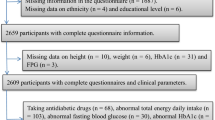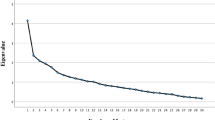Abstract
The data for the effect of dietary magnesium (Mg) on hemoglobin glycation index (HGI) is limited. Thus, this study aimed to examine the relationship between dietary Mg and HGI in the general population. Our research used data from the National Health and Nutrition Examination Survey from 2001 to 2002. The dietary intake of Mg was assessed by two 24-h dietary recalls. The predicted HbA1c was calculated based on fasting plasma glucose. Logistic regression and restricted cubic spline models were applied to assess the relationship between dietary Mg intake and HGI. We found a significant inverse association between dietary Mg intake and HGI (β = − 0.00016, 95%CI: − 0.0003, − 0.00003, P = 0.019). Dose–response analyses revealed that HGI decreased with increasing intakes of Mg when reached the point above 412 mg/day. There was a linear dose–response relationship between dietary Mg intake and HGI in diabetic subjects, and there was an L-shape dose–response relationship in non-diabetic individuals. Increasing the intake of Mg might help lower the risk associated with high HGI. Further prospective studies are requested before dietary recommendations.




Similar content being viewed by others
Data Availability
The datasets can be found in online repositories (https://wwwn.cdc.gov/nchs/nhanes/). This study was available from corresponding author upon reasonable request.
References
Vormann J (2017) Magnesium: nutrition and homoeostasis. AIMS public health 3(2):329–340. https://doi.org/10.3934/publichealth.2016.2.329
Nielsen FH (2018) Dietary magnesium and chronic disease. Adv Chronic Kidney D 25(3):230–235. https://doi.org/10.1053/j.ackd.2017.11.005
Barbagallo M, Veronese N, Dominguez LJ (2021) Magnesium in aging, health and diseases. Nutrients 13(2):463. https://doi.org/10.3390/nu13020463
Fang X, Han H, Li M, Liang C, Fan Z, Aaseth J, He J, Montgomery S, Cao Y (2016) Dose-response relationship between dietary magnesium intake and risk of type 2 diabetes mellitus: a systematic review and meta-regression analysis of prospective cohort studies. Nutrients 8(11):739. https://doi.org/10.3390/nu8110739
El WA, Naser IA, Taleb MH, Abutair AS (2018) The effects of oral magnesium supplementation on glycemic response among type 2 diabetes patients. Nutrients 11(1):44. https://doi.org/10.3390/nu11010044
American Diabetes Association Professional Practice Committee (2022) 2.Classification and diagnosis of diabetes: standards of medical care in diabetes-2022. Diabetes care 45(Suppl 1):S17–S38. https://doi.org/10.2337/dc22-S002
Beltran Del Rio M, Tiwari M, Amodu LI, Cagliani J, Rodriguez Rilo HL (2016) Glycated hemoglobin, plasma glucose, and erythrocyte aging. J Diabetes Sci Technol 10(6):1303–1307. https://doi.org/10.1177/1932296816659885
Wang J, Zhang L, Bai Y, Wang X, Wang W, Li J, Zhou S (2023) The influence of shorter red blood cell lifespan on the rate of HbA1c target achieved in type 2 diabetes patients with a HbA1c detection value lower than 7. J Diabetes 15(1):7–14. https://doi.org/10.1111/1753-0407.13345
Hempe JM, Hsia DS (2022). Variation in the hemoglobin glycation index. J Diabetes Complications 36(7):108223. https://doi.org/10.1016/j.jdiacomp.2022.108223
Nayak AU, Singh BM, Dunmore SJ (2019) Potential clinical error arising from use of HbA1c in diabetes: effects of the glycation gap. Endocr Rev 40(4):988–999. https://doi.org/10.1210/er.2018-00284
Steen SC, Woodward M, Chalmers J, Li Q, Marre M, Cooper ME, Hamet P, Mancia G, Colagiuri S, Williams B, Grobbee DE, DeVries JH, ADVANCE Collaborative Group (2018) Haemoglobin glycation index and risk for diabetes-related complications in the Action in Diabetes and Vascular Disease: Preterax and Diamicron Modified Release Controlled Evaluation (ADVANCE) trial. Diabetologia 61(4):780–9. https://doi.org/10.1007/s00125-017-4539-1
Wu JD, Liang DL, Xie Y, Chen MY, Chen HH, Sun D, Hu HQ (2021) Association between hemoglobin glycation index and risk of cardiovascular disease and all cause mortality in type 2 diabetic patients: a meta-analysis. Front Cardiovasc Med 8:690689. https://doi.org/10.3389/fcvm.2021.690689
Zipf G, Chiappa M, Porter KS, Ostchega Y, Lewis BG, Dostal J (2013) National health and nutrition examination survey: plan and operations, 1999–2010. Vital Health Stat 1(56):1–37
Williams B, Mancia G, Spiering W, Rosei EA, Azizi M, Burnier M, Clement DL, Coca A, Simone GD, Dominiczak A, Kahan T, Mahfoud F, Redon J, Ruilope L, Zanchetti A, Kerins M, Kjeldsen SE, Kreutz R, Laurent S, Lip GYH, McManus R, Narkiewicz K, Ruschitzka F, Schmieder RE, Shlyakhto E, Tsioufis C, Aboyans V, Desormais I, ESC Scientific Document Group (2018) 2018 ESC/ESH Guidelines for the management of arterial hypertension. Eur Heart J 39(33):3021–3104. https://doi.org/10.1093/eurheartj/ehy339
Yoon SS, Carroll MD, Johnson CL, Gu Q (2011) Cholesterol management in the United States: the national health and nutrition examination survey, 1999 to 2006. Ann Epidemiol 21(5):318–326. https://doi.org/10.1016/j.annepidem.2011.01.004
Inoue K, Ritz B, Brent GA, Ebrahimi R, Rhee CM, Leung AM (2020) Association of subclinical hypothyroidism and cardiovascular disease with mortality. JAMA Netw Open 3(2):e1920745. https://doi.org/10.1001/jamanetworkopen.2019.20745
United States Department of Health and Human Services (2020) Dietary Guidelines for Americans. https://www.dietaryguidelines.gov. Accessed 20 February 2022
Waanders F, Dullaart RPF, Vos MJ, Hendriks SH, Goor HV, Bilo HJG, Dijk PRV (2020) Hypomagnesaemia and its determinants in a contemporary primary care cohort of persons with type 2 diabetes. Endocrine 67(1):80–86. https://doi.org/10.1007/s12020-019-02116-3
Gommers LM, Hoenderop JG, Bindels RJ, de Baaij JH (2016) Hypomagnesemia in type 2 diabetes: a vicious circle? Diabetes 65(1):3–13. https://doi.org/10.2337/db15-1028
Fang X, Wang K, Han D, He X, Wei J, Zhao L, Imam MU, Ping Z, Li Y, Xu Y, Min J, Wang F (2016) Dietary magnesium intake and the risk of cardiovascular disease, type 2 diabetes, and all-cause mortality: a dose-response meta-analysis of prospective cohort studies. BMC Med 14(1):210. https://doi.org/10.1186/s12916-016-0742-z
Afzali H, Jafari Kashi AH, Momen-Heravi M, Razzaghi R, Amirani E, Bahmani F, Gilasi HR, Asemi Z (2019) The effects of magnesium and vitamin E co-supplementation on wound healing and metabolic status in patients with diabetic foot ulcer: a randomized, double-blind, placebo-controlled trial. Wound Repair Regen 27(3):277–284. https://doi.org/10.1111/wrr.12701
Lee J, Lee YA, Kim JH (2019) Discrepancies between glycosylated hemoglobin and fasting plasma glucose for diagnosing impaired fasting glucose and diabetes mellitus in Korean youth and young adults. Diabetes Metab J 43(2):174–182. https://doi.org/10.4093/dmj.2018.0046
Campbell L, Pepper T, Shipman K (2019) HbA1c: a review of non-glycaemic variables. J Clin Pathol 72(1):12–19. https://doi.org/10.1136/jclinpath-2017-204755
Hempe JM, Yang S, Liu S, Hsia DS (2021) Standardizing the haemoglobin glycation index. Endocrinol Diabetes Metab 4(4):e00299. https://doi.org/10.1002/edm2.299
Steen SCV, Schrieks IC, Hoekstra JB, Lincoff AM, Tardif JC, Mellbin LG, Rydén L, Grobbee DE, DeVries JH, AleCardio study group (2017) The haemoglobin glycation index as predictor of diabetes-related complications in the AleCardio trial. Eur J Prev Cardiol 24(8):858–866. https://doi.org/10.1177/2047487317692664
Piuri G, Zocchi M (2021) Magnesium in obesity, metabolic syndrome, and type 2 diabetes. Nutrients 13(2):320. https://doi.org/10.3390/nu13020320
Hata A, Doi Y, Ninomiya T, Mukai N, Hirakawa Y, Hata J, Ozawa M, Uchida K, Shirota T, Kitazono T, Kiyohara Y (2013) Magnesium intake decreases type 2 diabetes risk through the improvement of insulin resistance and inflammation: the Hisayama Study. Diabet Med 30(12):1487–1494. https://doi.org/10.1111/dme.12250
Simental-Mendía LE, Rodríguez-Morán M, Reyes-Romero MA, Guerrero-Romero F (2012) No positive effect of oral magnesium supplementation in the decreases of inflammation in subjects with prediabetes: a pilot study. Magnes Res 25(3):140–146. https://doi.org/10.1684/mrh.2012.0322
Talebi S, Miraghajani M, Hosseini R, Mohammadi H (2022) The effect of oral magnesium supplementation on inflammatory biomarkers in adults: a comprehensive systematic review and dose-response meta-analysis of randomized clinical trials. Biol Trace Elem Res 200(4):1538–1550. https://doi.org/10.1007/s12011-021-02783-2
Geiger H, Wanner C (2012) Magnesium in disease. Clin Kidney J 5(Suppl 1):i25–i38. https://doi.org/10.1093/ndtplus/sfr165
Acknowledgements
Thanks to all individuals who collected data and making the NHANES datasets available on the website.
Funding
This study was supported by the National Natural Science Foundation of China (Grant Award: 82000743).
Author information
Authors and Affiliations
Contributions
C.J, W.X.Z, and G.P.X contributed to the study conception and design. Material preparation, data collection, and analysis were performed by L.S and X.X.W. The first draft of the manuscript was written by C.J and L.S, and all authors commented on previous versions of the manuscript. All authors read and approved the final manuscript.
Corresponding authors
Ethics declarations
Ethics Approval
This study was performed in line with the principles of the Declaration of Helsinki. Approval was granted by the Ethics Committee of the United States National Center for Health Statistics.
Consent to Participate
Written informed consent was obtained from the parents.
Conflict of Interest
The authors declare no competing interests.
Additional information
Publisher's Note
Springer Nature remains neutral with regard to jurisdictional claims in published maps and institutional affiliations.
Rights and permissions
Springer Nature or its licensor (e.g. a society or other partner) holds exclusive rights to this article under a publishing agreement with the author(s) or other rightsholder(s); author self-archiving of the accepted manuscript version of this article is solely governed by the terms of such publishing agreement and applicable law.
About this article
Cite this article
Chen, J., Lin, S., Wang, X. et al. Lower Dietary Magnesium Is Associated with a Higher Hemoglobin Glycation Index in the National Health and Nutrition Examination Survey. Biol Trace Elem Res 202, 878–884 (2024). https://doi.org/10.1007/s12011-023-03727-8
Received:
Accepted:
Published:
Issue Date:
DOI: https://doi.org/10.1007/s12011-023-03727-8




